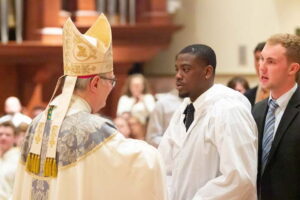by The Cowl Editor on October 10, 2019
Opinion

by Joseph Kulesza ’22
Opinion Staff
Having transferred to Providence College this year, there have been many aspects of this school and its religious principles that I have been able to contrast with my not-so-distant experience at a secular one.
My freshman year at a secular business university gave me thorough exposure to the general philosophy and mission of the school, and I now find myself in a unique position to compare the two institutions given that I have spent time as a student at both.
Despite my experience being limited to two schools relative to a country where there are over 3,000, it is safe to say that there are general principles associated with any religious or secular institution that allow them to be categorized in their respective categories of “religious” or “non-sectarian” in the first place.
The underlying pedagogy of many secular schools is influenced by a philosophy known as vocationalism, where schools design their curriculums to operate as means towards achieving the end goal of making their students employable.
In no way is this a negative aspect of any college, given that society needs highly skilled workers to contribute towards the development of new products, more efficient manufacturing processes, and an economy that increases the quality of life for as many people as possible.
But many secular schools have taken their mission of making students employable to an extreme degree, and have pursued this goal so thoroughly that it has become mutually exclusive to other aspects of higher education.
As a result, many universities have been reduced to white collar vocational schools, where students are instructed to become experts in their field rather than well-rounded human beings. In this view, obtaining a degree is merely transactional.
This transaction facilitated between the college administration and students is widely considered to be a prudent investment, but is also highly limiting in so far as degrees from many schools have the tendency to represent knowledge applicable to only a certain industry or profession. And while engineering schools produce skilled structural engineers that design the bridges we drive on, art schools graduate students who design our kitchens and homes, and business schools produce savvy financial analysts who we entrust with our retirement money, we are all human beings before we are engineers, interior designers, or financial advisors.
It is this education in our shared humanity that make Catholic schools so special, given that just because something is not practical to learn, does not mean it is unnecessary to learn.
This viewpoint of getting an education that may be regarded as unnecessary and possibly impractical is expressed by many other, and more persuasive, individuals as well. Included in this list is Pope Pius XI when he says “that true education is directed towards the ultimate ends.”
In addition to a previous Pope, other noteworthy people have also given their two cents on higher education. Jacques Maritain was a philosopher during the height of Neo-Scholasticism, and argued that the person is “fundamentally connected to humanity, and in common with all humanity has a spiritual life directed toward some greater good than just individual self-aggrandizement.”
Are Jacques Maritain, Pope Pius XI, and I arguing that you are forever barred from living a life of meaning and purpose, and are condemned to the depths of hell if you do not attend a college that has a crucifix on every wall? No.
What the aforementioned religious leaders and I are arguing is that Catholic schools and their curriculums are more conducive to developing students into individuals who are more than just skilled professionals.
When all is said and done, might you not be as savvy in utilizing Linkedin to network compared with students at a school that has entire courses dedicated to using this software? Probably. And might your required philosophy, literature, and DWC classes take up credits that could have otherwise been used to learn technical skills that are of demand in the modern day job market? Yes.
However, at PC, questions are asked that nourish our existential and spiritual foundation. And answers are given that express what it means to be human, the purpose of life, and how we should go about living a virtuous one.